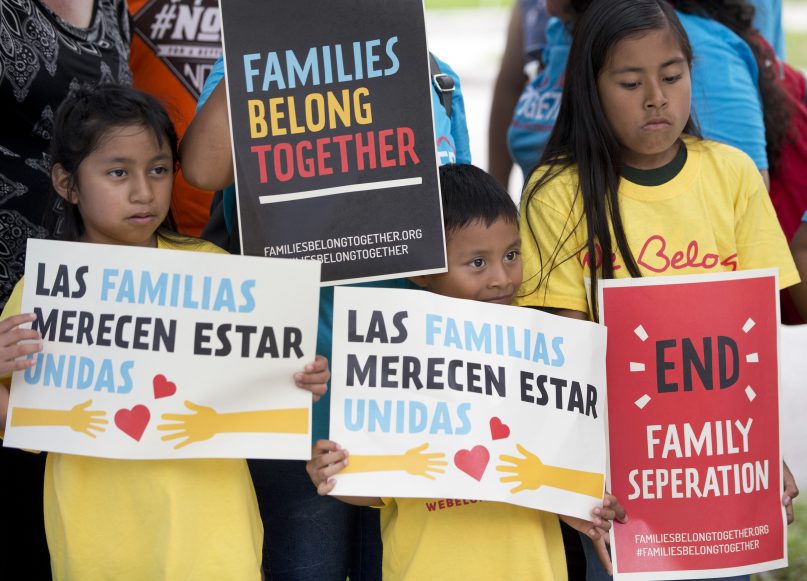At my synagogue Saturday, we marked Independence Day by omitting Conservative Judaism’s rather anodyne prayer for the United States, which begins, “Our God and God of our ancestors: We ask Your blessings for our country—for its government, for its leaders and advisors, and for all who exercise just and rightful authority.”
Instead, we read the edgier prayer that Reform Jews say, starting with, “O Guardian of life and liberty, may our nation always merit Your protection.”
Then we recited the first of a new series of psalms by writer Alden Solovy: “A psalm of protest/ When children are stripped from their parents’ arms,/ When refugees are jailed as criminals. How long, God of justice?/ How long will arrogance strike with impunity,/ Attacking the heart of innocence?”
Finally, in place of the usual concluding hymn “Adon Olam” (“Sovereign of the Universe”), we sang “This Land is Your Land,” complete with Woody Guthrie’s usually omitted fourth verse:
As I went walking I saw a sign there
And on the sign it said “No Trespassing.”
But on the other side it didn’t say nothing,
That side was made for you and me.
Our synagogue is not particularly political, and what with a certain number of Republicans sprinkled in among the Democrats, it’s fair to say that this liturgical exercise would not have occurred a few years ago. But the Trump administration’s immigration policies has made it increasingly problematic for Jewish communities to avoid taking a stand—even as doing so has become more fraught.
Thus, a year ago, the Jewish Federation of Greater Hartford issued a statement strongly condemning the administration’s policy of separating children from parents at the southern border. “As Jews, we know what it is like to leave one’s country of origin in search of peace and freedom from oppression,” the statement reads. “Our Torah reminds us again and again that we should not wrong or oppress a stranger, because we too were once strangers in a new land.”
Signed by the Federation’s board chair and president and by the board chair and director of the Federation’s Jewish Community Relations Council, it concluded:
Children should never become pawns in a harsh political calculus. The resulting emotional trauma may have profound, long-term consequences in their lives. We stand with dozens of national organizations from across the spectrum of Jewish tradition in condemning this immoral policy and demanding that the administration rescind it.
Who, in our community, could object to this forthright assertion of Jewish moral values, delivered as part of a large chorus of condemnation—Gentile as well as Jewish, Republican as well as Democratic?
The answer was that there were strong objectors, some of whom sent the Federation’s then-president, Howard Sovronsky, what he described to me as “terrible, nasty emails.” So far as these members of our community were concerned, criticism of President Trump was more objectionable than the forced separation of children and parents.
A month later, our congregation hosted “Responding to the Trauma of Children at Our Borders,” a teach-in featuring psychiatrists who specialize in trauma work and treating children, and a woman who escaped the Holocaust thanks to the Kindertransport, the rescue effort that brought thousands of Jewish children from Nazi Germany to Great Britain between 1938 and 1940.
Among the event’s many area co-sponsors were most area synagogues, the Jewish community center, Jewish Family Services of Greater Hartford, and the Connecticut ADL. But not the Hartford Federation or its Community Relations Council. Why?
According to Sovronsky, there was some confusion about the nature of the event, and a lack of sufficient communication on the part of the organizers. Maybe so. But I suspect they would have been on board had it not been for those ugly emails and the dissent they signaled.
“Instead of trying to figure out what positions we want to take, the best place to be is to promote civil discourse, to present both sides,” Sovronsky said. “It’s a change because everything is so damned politicized now, and that’s the problem.”
But as Ecclesiastes might have said, there is a time to encourage civil discourse and there is a time to stand up for what’s right. This land is your land. This land is our land. And that side is made for you and me.






